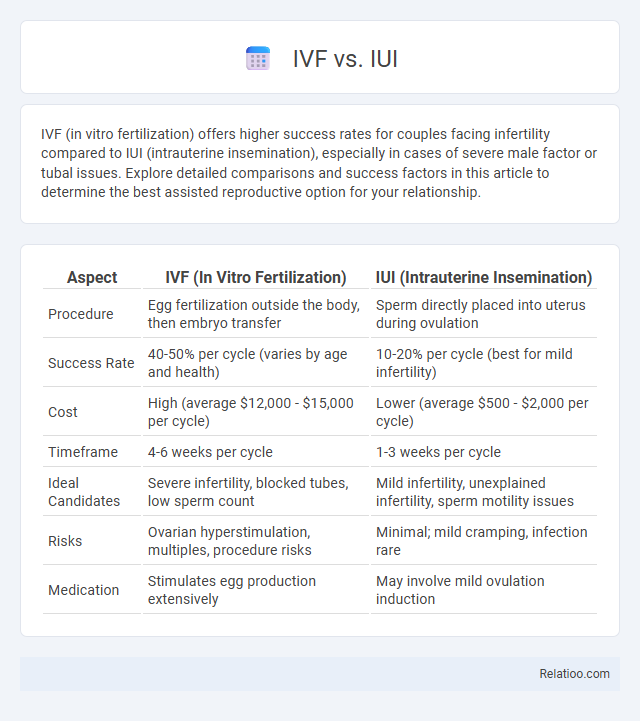IVF (in vitro fertilization) offers higher success rates for couples facing infertility compared to IUI (intrauterine insemination), especially in cases of severe male factor or tubal issues. Explore detailed comparisons and success factors in this article to determine the best assisted reproductive option for your relationship.
Table of Comparison
| Aspect | IVF (In Vitro Fertilization) | IUI (Intrauterine Insemination) |
|---|---|---|
| Procedure | Egg fertilization outside the body, then embryo transfer | Sperm directly placed into uterus during ovulation |
| Success Rate | 40-50% per cycle (varies by age and health) | 10-20% per cycle (best for mild infertility) |
| Cost | High (average $12,000 - $15,000 per cycle) | Lower (average $500 - $2,000 per cycle) |
| Timeframe | 4-6 weeks per cycle | 1-3 weeks per cycle |
| Ideal Candidates | Severe infertility, blocked tubes, low sperm count | Mild infertility, unexplained infertility, sperm motility issues |
| Risks | Ovarian hyperstimulation, multiples, procedure risks | Minimal; mild cramping, infection rare |
| Medication | Stimulates egg production extensively | May involve mild ovulation induction |
Introduction to IVF and IUI
IVF (In Vitro Fertilization) and IUI (Intrauterine Insemination) are two common fertility treatments designed to assist couples struggling with infertility. IVF involves fertilizing an egg outside the body and then implanting the embryo directly into the uterus, offering a higher success rate for severe fertility issues. IUI, on the other hand, is a less invasive procedure that places sperm directly into the uterus around the time of ovulation, making it a suitable option for mild fertility problems or unexplained infertility that might be your first step in treatment.
Understanding the IVF Process
The IVF process involves stimulating the ovaries to produce multiple eggs, retrieving these eggs, fertilizing them with sperm in a lab, and transferring the resulting embryos into the uterus. Unlike IUI, which introduces sperm directly into the uterus to facilitate fertilization naturally, IVF bypasses several biological barriers, increasing the chances of conception for those facing infertility. Understanding each step helps you make informed decisions about which fertility treatment aligns best with your reproductive goals and medical needs.
Overview of the IUI Procedure
Intrauterine insemination (IUI) is a fertility treatment that involves placing washed and concentrated sperm directly into the uterus around the time of ovulation, enhancing the chances of fertilization. This minimally invasive procedure is often recommended for couples with mild male factor infertility, unexplained infertility, or cervical mucus problems. Your fertility specialist will monitor ovulation and carefully time the insemination to optimize success rates, making IUI an accessible and cost-effective option compared to in vitro fertilization (IVF).
Key Differences Between IVF and IUI
IVF (In Vitro Fertilization) involves fertilizing an egg outside the body and transferring the embryo directly into the uterus, while IUI (Intrauterine Insemination) places sperm inside the uterus to facilitate natural fertilization. IVF offers higher success rates for complex fertility issues, including blocked fallopian tubes or severe male infertility, whereas IUI is less invasive, cost-effective, and suitable for mild fertility problems or unexplained infertility. Understanding these key differences helps Your fertility specialist tailor treatment plans to maximize outcome effectiveness based on the specific cause of infertility.
Success Rates: IVF vs IUI
IVF (In Vitro Fertilization) generally offers higher success rates compared to IUI (Intrauterine Insemination), especially for patients with severe fertility issues or older age. While IUI success rates typically range from 10-20% per cycle, IVF success rates can reach 40-50% per cycle, depending on factors such as age and embryo quality. Understanding these differences helps you make informed decisions tailored to your fertility journey.
Cost Comparison: IVF and IUI
In vitro fertilization (IVF) typically costs between $12,000 and $15,000 per cycle, making it significantly more expensive than intrauterine insemination (IUI), which averages around $500 to $4,000 per cycle depending on medications used. IVF involves advanced laboratory procedures like egg retrieval and embryo transfer, contributing to its higher price point compared to the simpler insemination process in IUI. Insurance coverage for both treatments varies widely, but out-of-pocket expenses for IVF tend to be substantially higher, impacting accessibility for many couples seeking fertility solutions.
Factors Influencing Treatment Choice
Factors influencing the choice between IVF, IUI, and other fertility treatments include age, underlying infertility causes, and ovarian reserve. IVF is often recommended for severe tubal damage, low sperm count, or unexplained infertility after failed IUI cycles. Cost, success rates, and the invasiveness of procedures also play crucial roles in selecting the most appropriate fertility treatment.
Risks and Side Effects of IVF and IUI
IVF (In Vitro Fertilization) carries risks such as ovarian hyperstimulation syndrome (OHSS), multiple pregnancies, and complications from egg retrieval, while IUI (Intrauterine Insemination) generally has fewer side effects but carries a lower success rate and risks of mild ovarian hyperstimulation and infection. Both procedures can cause emotional and physical stress, but IVF's invasive nature heightens the chance of adverse effects compared to the less invasive IUI. Fertility treatments should be tailored to individual health profiles to mitigate risks and maximize outcomes.
Who Should Consider IVF or IUI?
IVF (In Vitro Fertilization) is typically recommended for individuals with blocked fallopian tubes, severe male infertility, or unexplained infertility after failed IUI (Intrauterine Insemination) attempts. IUI is suitable for couples with mild male factor infertility, cervical mucus issues, or unexplained infertility under 35 years old with no severe reproductive disorders. Fertility specialists assess factors such as age, ovulation quality, sperm count, and tubal patency to determine whether IVF or IUI offers the best chance for conception.
Making the Right Fertility Decision
Choosing between IVF, IUI, and other fertility treatments depends on factors like age, fertility diagnosis, and treatment history. IVF offers higher success rates for severe fertility issues, while IUI is less invasive and suitable for mild cases or unexplained infertility. Consulting a fertility specialist for personalized evaluation and understanding success probabilities ensures the most effective and informed fertility decision.

Infographic: IVF vs IUI
 relatioo.com
relatioo.com